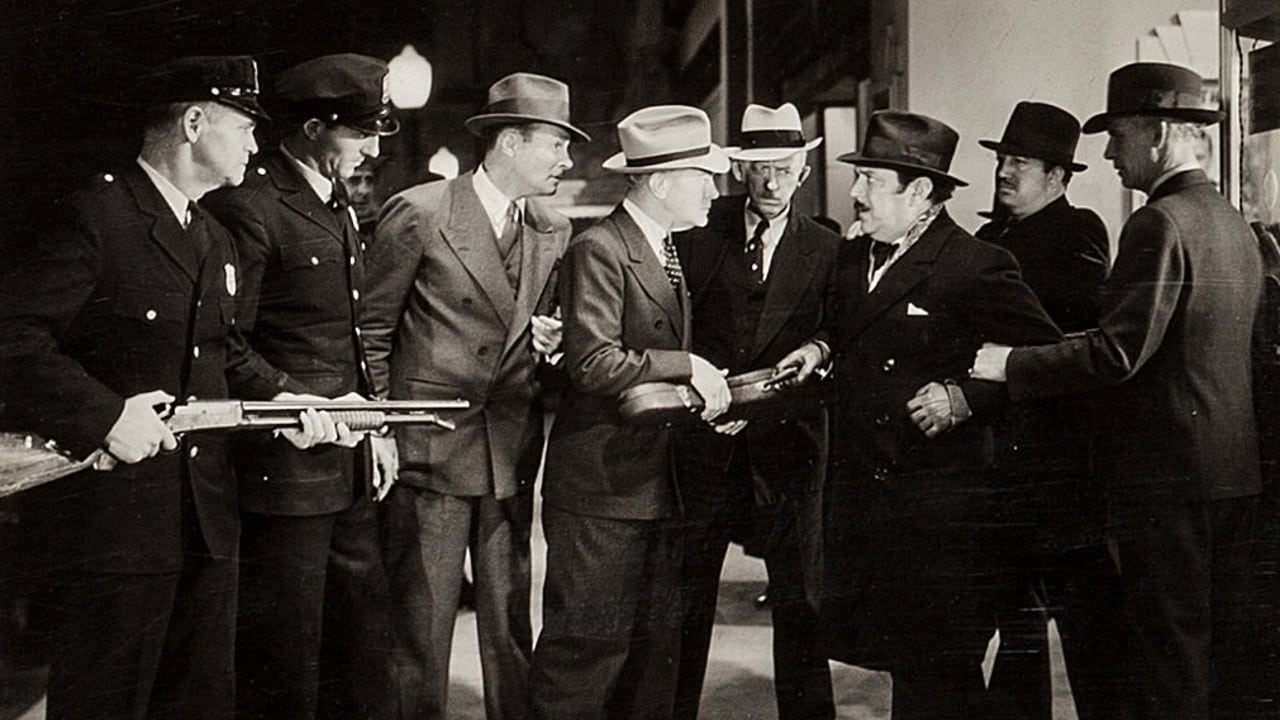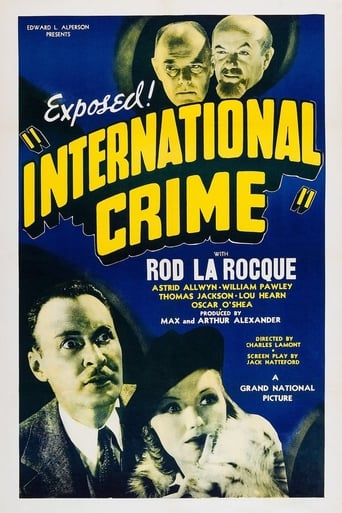

Copyright 18 April 1938 by Grand National Films, Inc. New York opening at the Globe 15 May 1938. U.S. release: 2 April 1938. Australian release through British Empire Films: 27 June 1940. 5,874 feet. 64 minutes.SYNOPSIS: Lamont Cranston, alias The Shadow (Rod La Rocque) is a witty Walter Winchell character who writes and broadcasts a newspaper column in which he lampoons the city's bungling police force. The commissioner (Thomas Jackson) is not amused. He retaliates by banning Cranston's newspaper from access to all press release bulletins issued by his department. Cranston rescues the paper by foiling an elaborate murder/embezzlement plot and handing the police a full (if totally undeserved) credit for the capture of the criminals. NOTES: Second of the seven The Shadow pictures. The first, The Shadow Strikes (1937) also starred Rod La Rocque. Third was a Columbia serial, The Shadow (1940), starring Victor Jory. Monogram Pictures entered the fray in 1946 with The Shadow Returns, starring Kane Richmond, who also played The Shadow in Behind the Mask (1946) and The Missing Lady (1946). Finally, Republic lensed Bourbon Street Shadows in 1958, starring Richard Derr.COMMENT: One of the best "B" films ever made, it's hard to believe that this movie is so little-known today. Based on an extremely popular radio serial, you'd expect to find a host of fans singing the picture's praises. Well, perhaps not. The Shadow depicted here cleverly departs somewhat from the comic strip character with cloak and wide-brimmed hat. Instead La Rocque and his ingenious scriptwriter have opted to present the hero as a suave, sarcastic radio commentator who has it in for the police. In fact the skillful debunking of authority figures is so thoroughly amusing, I marvel that International Crime has not been singled out for special attention by the cultists. The problem here of course is that former matinee idol La Rocque, despite his ingratiating performance (we love the scene in which he runs through a variety of foreign accents in radioese for the benefit of the My Friend Irma-brained heroine, so capably impersonated by Astrid Allwyn), is unknown to the corduroy set. A pity. La Rocque provides a delightful spoof of the conventionally brash hero, his tongue smoothly tripping through polished lines of delicious invective that never flag from start to finish.La Rocque alone would be worth many times the price of admission. But, as it happens, The Shadow is not the only colorful character in the play. In fact the script allows a wonderful line-up of our favorite bit players many a choice moment. For instance, Thomas Jackson has a great time as the harassed police chief and - though I've not the space to run through the whole cast - William Pawley as a reformed safecracker, Will Stanton as a jail drunk and most especially, Lew Hearn as a too obliging cab-driver are absolute musts for special accolades. As for the direction, Charles Lamont has rarely been so stylish. His only films which bear comparison to this sterling effort are the much-praised horror spoofs of the mid-1950s such as Abbott and Costello Meet Dr Jekyll and Mr Hyde and Francis in the Haunted House which do have a cult following. International Crime is equally amusing, far more quirky and much more forcefully acted. Furthermore it's superbly photographed by Marcel Le Picard whom I always regarded as one of the worst hacks in the business. I was wrong. It seems that Le Picard was rarely given an opportunity to show us what marvelously atmospheric effects he was really capable of achieving.
... View MoreDirector Charles Lamont and star Rod LaRocque had both been around for a LONG time in the silents. In this talkie, LaRocque is radio host Lamont Cranston, who thinks he gets a hot tip of a crime about to happen from "citizen" Phoebe Lane (Astrid Allwyn). When things don't turn out right, the cops are upset, so now its up to Cranston to solve the mystery himself. The sound and picture quality are remarkably good, as opposed to some of the other oldies showing on "Moonlight Movies" channel. It's just okay. Sub plot wherePhoebe interferes at first, but then is his ally, and it turns out she is related to the big boss publisher. Mildly entertaining, but very so-so. There are so many better things to watch...
... View MoreRod Laroque is back for a second film as Lamont Cranston. As presented here, the Shadow is none other than a radio host who does a nightly broadcast commenting on crime in the city and offering theories and suggestions to listeners and police alike—he's a kind of Walter Winchell of crime.The plot concerns a blown up safe, a murder, and a large sum of money that a pair of shady Europeans are attempting to send or prevent from being sent over to their homeland. Those plot details are not abundantly clear; however, plot here is really secondary to the witty interactions between characters that produce quite an entertaining little film.There is, of course, the police commissioner who resents the Shadow's criticism but never misses a broadcast; Moe the cabbie always on standby to transport Cranston; and Cranston's crusty news editor.Most importantly, there is Astryd Allwyn as Phoebe Lane, a sort of unwanted assistant to Cranston who has her job only because she is the publisher's niece. Allwyn brings in misleading scoops, follows her boss around despite his protests, and—when alone in the office studio—practices her own radio broadcasts, imagining herself as the real brains behind the Shadow ("Ladies and gentleman, this is Phoebe Lane, the Shadow's shadow "). Allwyn and Laroque have a nice chemistry and some fun wordplay; especially silly but amusing is the scene in which Cranston tries out on her every European accent he knows as they narrow down the nationality of the mysterious man she had earlier encountered.This Lamont Cranston is a harder egg than the one seen in the previous year's The Shadow Strikes. Early on in the picture, he is asked, "If it wasn't robbery, what was it?" His one word answer—"Murder"—is delivered while lighting a cigarette and with an edge altogether different from the secretive and somewhat mild character he played in the earlier film.Whether or not this Shadow is a worthy entry among the uneven ranks of other movie Shadows is for the purists to decide; taken strictly on its own as a low-budget mystery, International Crime is fast-paced, easy to watch and offers plenty of laughs.
... View MoreThis picture has all the slap dash feel of it's predecessor, "The Shadow Strikes" from the prior year, also starring Rod LaRocque. Even movie neophytes can figure out that this Shadow has no resemblance at all to the character made famous in pulp magazines of the era. To make matters worse, Lamont Cranston even utters the line from my summary above, lending credence to the idea that the writers of this picture really had no idea what they were doing. It was simply an attempt to capitalize on the Shadow name by putting together a loosely constructed story around a murder and espionage scheme involving foreign bonds, and it's so convoluted that it's hard to maintain focus while watching.Case in point - the lounge scene when Phoebe Lane (Astrid Allwyn) intrudes upon Cranston's conversation with the two foreigners. The bad guys want to lure the couple back to their apartment for a drink, Cranston (in a disguise consisting of a single monocle) declines, Phoebe insists on going. Once outside, it looks like rain, can't go, Cranston gives Phoebe the bum's rush, and the pair of international heavyweight crime barons just go along with it.Believe it or not, the most interesting thing I found about this picture had to do with the posters outside the Metropolitan Theater where Phoebe's phony robbery tip sent Cranston and the police. Still playing from 1937 was Jimmy Cagney's "Something to Sing About". What I couldn't figure out though, was why the film makers decided to place Cranston and Commissioner Weston (Thomas E. Jackson) directly in front of an ad for 'Zino-Pads for Corns'. That my friends, probably said all it needed to about the picture.
... View More